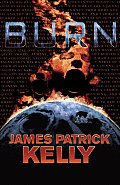James Patrick Kelly is one of the pre-eminant short fiction writers in the SF genre, so it may not come as a surprise to learn that Burn is a novella rather than a novel. Its only print publication (at least so far) is as a relatively expensive hardcover through a small press, but it's also available on-line in various formats (particularly given that it was short-listed for the 2006 Hugo).
The setting of the story is an undesirable planet taken over by a settlement of devotees of Thoreau and his views on simplicitly of life. Over the course of the story, one learns that the rest of human-controlled space has gone far down the path of technological development; various modifications of humans are hinted at, and one supporting character is an uploaded mind of some sort. The world of Walden, however, is a refuge for unmodified humans, living a simple rural life that is likely to remind the modern reader of the Amish (although Thoreau's philosophies have a subtly different motivation).
Two things are interfering with that utopia. First, the original settlers refused to leave, and now tha the Walden settlers are spreading a fast-growing type of tree that's covering the planet, they're starting fires to fight back, often via self-immolation. Second, the protagonist Spur, one of the Walden forest fire-fighters, is recovering from burns suffered in one of those attacks in a very sophisticated hospital and contacts an off-worlder with a very similar name on a whim while there. As a result, High Gregory of Kenning, a particularly enthusiastic and apparently powerful 10-year-old boy, shows up on Walden with a group of advisors and wants to poke his nose into everything.
It's a setup with many possibilities, but Burn never develops much momentum. The plot revolves around the attack that burned Spur, his troubled relationship with his wife, and the culture shock he goes through in the hospital and then again when coming home after getting some hints of the broader world. All of this is competently done, but seems mostly subtext and light on resolution. I never quite understood the motivations of Spur's wife (which robs a lot of power from the conclusion), the political context is mostly stated rather than shown, and I wanted more directness and more help from the author to understand what themes he was trying to explore. There is a twist at the end, a tactic that can work in the novella length although has a better chance in shorter lengths, but the twist didn't help the rest of the story settle into place.
It's possible, even likely, that I just missed the subtleties of this story. It's popular with other reviewers and draws adjectives like "thoughtful," and Cheryl Morgan found a contrast between war and forest fires that was lost on me the first time through. But Kelly also doesn't answer many of the questions that he raises, and I found this more frustrating than thought-provoking.
The clearest message is the question of the degree to which ignorance is suitable as a foundation for a utopian society, and whether a utopian society would fall apart in the presence of knowledge. Walden does exert a lot of central control over outside contact and apparently has some sort of deal with galactic powers that mostly keeps people from interfering with this. At the same time, there's a thriving black market of trade with the outside world via the terrorists who are starting fires. Kelly lays out, from the protagonist's perspective, both curiosity about the rest of the world and the advantages of a life of simplicity, and this conflict is successfully set up as far as it goes. It just never meshes satisfyingly with either the external chaos of High Gregory or the internal chaos of fighting fires set by terrorist rebels. High Gregory provides a bit of outside perspective, highlights practical places where knowledge can help, and sets up one problem with ignorance, namely the ease with which one's own rule sets can be manipulated by people with more knowledge, but I kept expecting his presence to be used in a more dramatic and satisfying way than he was.
Simply raising questions and describing a setting has value, but I prefer more plot and more foregrounded connection between plot and theme. Either Burn is too subtle for my taste or too subtle for my understanding at the time I read it; either way, I came away appreciating the quality of writing but feeling dissatisfied with the story. I don't recommend springing for the hardcover, although if the themes mentioned sound interesting, it's probably worth a read on-line (at least while it's available free).
Reviewed: 2006-06-19
